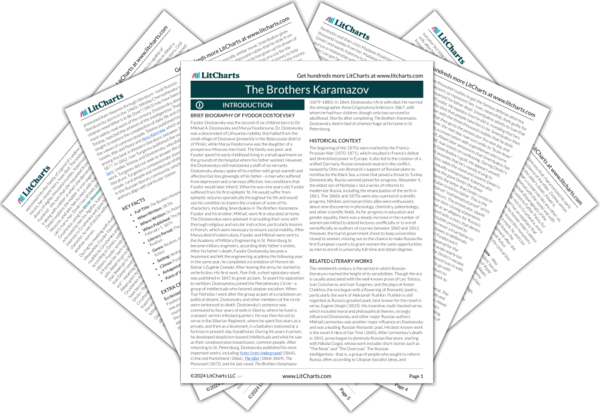Zosima, the Elder Quotes in The Brothers Karamazov
Part 2: Book 6, Chapter 3 Quotes
The people are festering with drink and cannot leave off. And what cruelty toward their families, their wives, and even their children, all from drunkenness! […] But God will save Russia, for though the simple man is depraved, and can no longer refrain from rank sin, still he knows that his rank sin is cursed by God and that he does badly in sinning. So our people still believe tirelessly in truth, acknowledge God, weep tenderly. Not so their betters. These, following science, want to make a just order for themselves by reason alone, but without Christ now, not as before, and they have already proclaimed that there is no crime, there is no sin. And in their own terms, that is correct: for if you have no God, what crime is there to speak of?
In Europe, the people are rising up against the rich with force, and popular leaders everywhere are leading them to bloodshed and teaching them that their wrath is righteous [….] Yet the Lord will save Russia, as he has saved her many times before. Salvation will come from the people, from their faith and their humility [….] I have been struck by the true and gracious dignity in our great people […] I can testify to it myself, I have seen it and marveled at it, seen it even in spite of the rank sins and beggarly appearance of our people. They are not servile, and that after two centuries of serfdom. They are free in appearance and manner, yet without any offense. And not vengeful, not envious. “You are noble, you are rich, you are intelligent and talented, very well, God bless you. I honor you, but I know that I, too, am a man [….]”

Zosima, the Elder Quotes in The Brothers Karamazov
Part 2: Book 6, Chapter 3 Quotes
The people are festering with drink and cannot leave off. And what cruelty toward their families, their wives, and even their children, all from drunkenness! […] But God will save Russia, for though the simple man is depraved, and can no longer refrain from rank sin, still he knows that his rank sin is cursed by God and that he does badly in sinning. So our people still believe tirelessly in truth, acknowledge God, weep tenderly. Not so their betters. These, following science, want to make a just order for themselves by reason alone, but without Christ now, not as before, and they have already proclaimed that there is no crime, there is no sin. And in their own terms, that is correct: for if you have no God, what crime is there to speak of?
In Europe, the people are rising up against the rich with force, and popular leaders everywhere are leading them to bloodshed and teaching them that their wrath is righteous [….] Yet the Lord will save Russia, as he has saved her many times before. Salvation will come from the people, from their faith and their humility [….] I have been struck by the true and gracious dignity in our great people […] I can testify to it myself, I have seen it and marveled at it, seen it even in spite of the rank sins and beggarly appearance of our people. They are not servile, and that after two centuries of serfdom. They are free in appearance and manner, yet without any offense. And not vengeful, not envious. “You are noble, you are rich, you are intelligent and talented, very well, God bless you. I honor you, but I know that I, too, am a man [….]”











